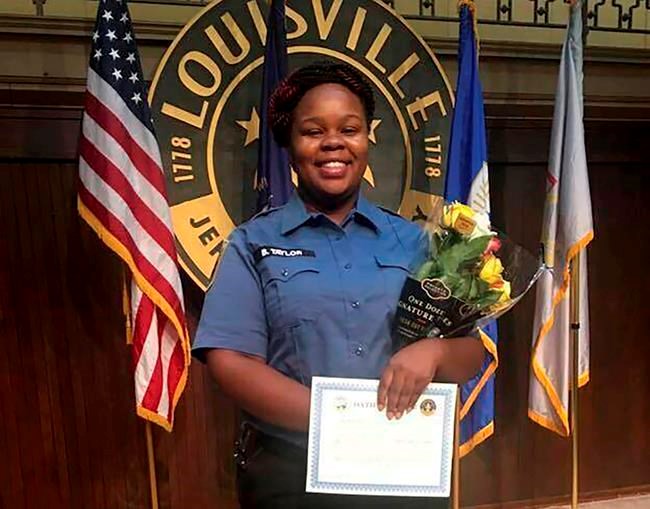LOUISVILLE, Ky. — Two more officers involved in the fatal shooting of Breonna Taylor have been fired — a detective believed to have fired the fatal shot and another who sought the search warrant that led to the deadly raid, authorities announced Wednesday.
The announcement came moments after city officials said the former Atlanta police chief would soon take over the Louisville Police Department after months of unrest over Taylor's death. Erika Shields served in Atlanta for 25 years, including more than three years as chief. Her tenure ended when she resigned in June after Atlanta officers fatally shot a Black man named Rayshard Brooks in a restaurant parking lot.
Detectives Myles Cosgrove, who shot Taylor, and Joshua Jaynes, who sought the warrant for the March 13 drug raid, were informed of their firings on Tuesday. Their dismissals follow that of officer Brett Hankison, who was fired in September after being indicted by a grand jury on charges of endangering Taylor’s
Taylor, a 26-year-old Black emergency medical technician, was killed as officers attempted to serve a no-knock search warrant. None of the three white officers who fired into her home were charged by a grand jury in her death.
Investigators said Cosgrove fired 16 rounds into the apartment after police breached the front door and Taylor’s boyfriend fired a shot at them. Federal ballistics experts said they believe the shot that killed Taylor came from Cosgrove.
In Cosgrove’s dismissal letter, interim Police Chief Yvette Gentry wrote that the detective violated the department’s use-of-force policies for firing 16 shots without identifying a target and for not activating his body camera. Gentry cited Cosgrove’s statements to internal investigators that he began firing at a “distorted shadowy mass” after Taylor’s boyfriend fired a single shot at officers.
“The shots you fired were in three different directions, indicating you did not verify a threat or have target acquisition,” Gentry wrote.
Jaynes, the detective who sought the narcotics warrant that led to the raid, was “untruthful” about how he obtained some information about Taylor in the warrant, Gentry wrote. Jaynes was not at the scene the night Taylor was shot.
In a May interview with Louisville police investigators, Jaynes acknowledged that he did not personally verify that a drug-trafficking suspect was receiving mail at Taylor’s apartment, even though he had said in an earlier affidavit that he had. Jaynes said he relied instead on information from a fellow officer.
“I acknowledge that you prepared the warrant in good faith,” Gentry wrote in a letter to Jaynes. “However you failed to inform the judge that you had no contact with the US postal inspector.”
Jaynes and Cosgrove have been on administrative reassignment, along with another officer who was at the raid, Sgt. Jonathan Mattingly.
Mattingly was shot in the leg by Taylor’s boyfriend, who said he thought an intruder was breaking into the home. Mattingly said in October that he intended to retire.
In September, Kentucky Attorney General Daniel Cameron, who took on the role of special prosecutor in the case, said Cosgrove and Mattingly were not charged with Taylor’s killing because they acted to protect themselves. The decision disappointed and angered protesters who have been calling for justice for Taylor for six months, and they vowed to stay in the streets until all the officers involved were fired or someone was charged with her killing.
Three grand jurors have since come forward to say that Cameron did not allow the grand jury to consider homicide-related charges against the officers for Taylor’s death. Speaking anonymously, the jurors said they believe they would have brought criminal charges against the officers if given the chance.
For months, Taylor’s name has been a rallying cry for activists protesting police killings of Black men and women. Famous musicians, actors, athletes and politicians have called for the officers’ arrests.
Trust between police and many in the city’s Black community has frayed since Taylor’s death, which sparked the firing of the city’s longtime chief, Steve Conrad. Two interim chiefs, including Gentry, the first Black woman to the lead the department, have served since Conrad was fired in June.
Shields will be the fourth person to lead the police force in Kentucky’s largest city since Taylor was shot.
“I commit to begin my work here with a focus on rebuilding community trust, trust that I believe was already eroding prior to Breonna Taylor’s killing,” Shields said. She also pledged to tackle gun violence in the city, which had a record 173 homicides in 2020.
Shields said she was “sickened” by Brooks’ shooting and that staying on as chief in Atlanta would have amounted to a distraction. To Louisville residents who might be upset over her hiring, Shields said she “would just ask that people step back, take the time to see what I accomplished, what I believe in and how I led the department.”
Shields starts the job on Jan. 19.
A day earlier, a Wisconsin prosecutor declined to file charges against a white police officer who shot a Black man in the back in August in Kenosha. The wounding of Jacob Blake, who was left paralyzed, also sparked protests over police brutality and racism. Authorities concluded that they could not disprove the officer’s contention that he acted in self-
Dylan Lovan, The Associated Press

